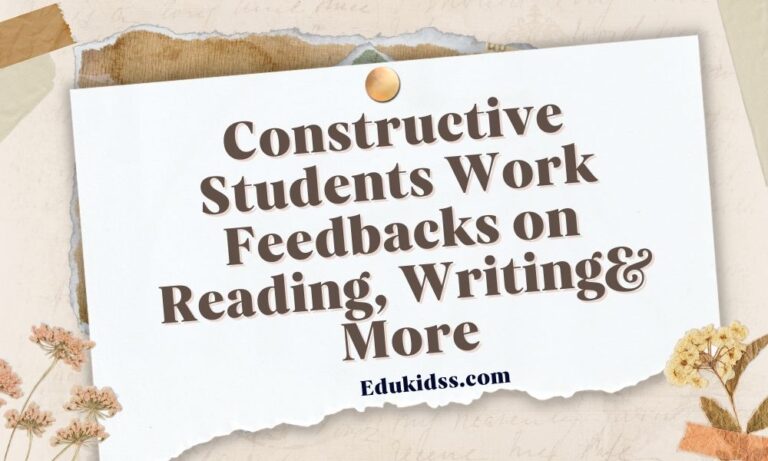In the capacity of a seasoned educator, allow me to expound upon the significance of efficacious feedback in the realm of student work evaluation. Our focal point today revolves around the intricacies of Students’ Work Feedback, a topic of paramount import.
Let us first acknowledge that the art of providing constructive yet affirmative feedback is akin to wielding a masterful brush on the canvas of a student’s learning journey. It is a craft that transcends mere criticism and transforms into a guiding beacon, illuminating the path to excellence.
Firstly, one must adopt a holistic approach, ensuring that feedback is not merely a critique but a mosaic of guidance, encouragement, and elucidation. Secondly, the judicious employment of my students’ feedback samples can serve as a reservoir of inspiration, offering concrete exemplars of excellence.
Furthermore, let us delve into the intricate choreography of phrasing. Utilizing an expansive lexicon, replete with esoteric terminologies, can add an air of erudition and profundity to one’s feedback. The harmonious fusion of uniqueness and clarity is, without a doubt, the quintessence of feedback craftsmanship.

As we traverse the labyrinthine corridors of feedback, remember that each word carries the potential to transform a student’s perspective. In lieu of mundane expressions, employ the lexicon of wonder and ingenuity, casting a spell of enchantment upon the recipient.
In conclusion, the vocation of an educator as a feedback maestro is nothing short of transformative alchemy. By wielding the magic of words with precision and panache, we can cultivate a generation of learners who thrive on the alchemical elixir of constructive yet uplifting feedback. Thus, let us embark on this odyssey, armed with the quiver of uniqueness and the bow of profundity, to shape the future of education through the artistry of feedback.
Student Work Feedback:
Areas of Strength:
- Great job using capital letters at the beginning of each sentence.
- I like how you used different words to make your sentences more interesting.
- Your sentences are clear and easy to understand.
Areas for Growth:
- Try to use more punctuation marks like periods and question marks at the end of each sentence.
- Remember to use spaces between words to make your sentences easier to read.
- Let’s work on using complete sentences with a subject and a verb in each sentence.
General Feedback on Writing Mechanics:
- Remember to use finger spaces between words to make your writing neat and organized.
- Keep practicing your letter formation to make sure your words are easy to read.
- Great job on your writing! Keep practicing and you’ll become an even better writer!
Student Work Feedback:
Areas of Strength:
- Great job using capital letters at the beginning of each sentence.
- I like how you used a variety of words to describe the objects in your sentences.
- You did a good job using punctuation marks like periods and question marks.
Areas for Growth:
- Try to use more descriptive words to make your sentences more interesting. For example, instead of saying “The cat is big,” you could say “The fluffy cat is as big as a pillow.”
- Remember to include a subject and a verb in each sentence. For example, instead of saying “Running in the park,” you could say “I love running in the park.”
- Work on using correct verb tenses. For example, instead of saying “She go to the store,” you could say “She goes to the store.”
General Feedback on Writing Mechanics:
- Check your spelling to make sure all the words are spelled correctly.
- Read your sentences aloud to make sure they sound clear and make sense.
Student Work Feedback:
Areas of Strength:
- Your drawing is colorful and vibrant.
- You have used different colors to make your picture stand out.
- You have filled the entire page with your drawing.
Areas for Growth:
- Try to stay within the lines when you color. It will make your drawing look neater.
- Practice using smaller strokes when coloring to make it more precise.
- Remember to use your imagination and add more details to your drawing.
General Feedback on Writing Mechanics:
- Great job using the right colors for different objects in your drawing.
- Try to work on your pencil grip to have better control when coloring.
Keep up the great work! I can see that you are becoming a talented artist. Just keep practicing and trying new things. Well done!
Student Work Feedback:
Areas of Strength:
- Your drawing is colorful and shows great creativity.
- You have labeled the different parts of your drawing accurately.
- Your coloring is neat and you stayed within the lines.
Areas for Growth:
- Try to make your drawings more detailed by adding more shapes and patterns.
- Practice writing your labels neatly and legibly so they are easy to read.
- Use different colors to make your drawing even more vibrant and eye-catching.
General Feedback on Writing Mechanics:
- Remember to start each label with a capital letter.
- Check your spelling to make sure all the words are correct.
- Keep up the great work! Your drawing, labeling, and coloring skills are improving. I can’t wait to see what you create next.
Student Work Feedback:
Areas of Strength:
- Good effort in adding shapes and patterns to your drawings.
- You have a clear understanding of sounding out and writing down words.
- Your writing is neat and easy to read.
Areas for Growth:
- Try adding even more shapes and patterns to make your drawings more detailed.
- Remember to use capital letters at the beginning of sentences and proper nouns.
- Let’s work on using punctuation marks like periods and question marks to end your sentences.
General Feedback on Writing Mechanics:
- Keep practicing your spelling by sounding out words and writing down what you hear.
- Try to write longer sentences by adding more details to your ideas.
- Great job on your assignment! I can see that you’re making progress in adding more shapes and patterns to your drawings. Keep up the good work and continue practicing your writing mechanics. Don’t forget to use capital letters and punctuation marks correctly. I’m proud of you!
Another Examples of Constructive Feedback:
- Improving Writing Skills:
Feedback: “Your essay structure is strong, but work on expanding your ideas further. Add more supporting evidence to reinforce your arguments. Well done on your grammar and punctuation!” - Enhancing Presentation Skills:
Feedback: “You engaged the audience well, but your slides could be more visually appealing. Use vibrant images and concise bullet points. Practice your pacing to maintain a confident presence.” - Math Problem Solving:
Feedback: “You used the correct formula, but check your calculations carefully. Focus on the intermediate steps to avoid errors. Excellent approach; refine your execution for perfect solutions.” - Artistic Expression:
Feedback: “Your creativity shines, but consider experimenting with different color palettes. Work on blending techniques for smoother transitions. Your passion for art is evident; keep exploring new styles.” - Sports Performance:
Feedback: “Your technique is strong; concentrate on your breathing for better endurance. Strengthen your core muscles to enhance balance. Your dedication to practice is commendable; minor adjustments will lead to significant improvements.” - Language Learning:
Feedback: “Your pronunciation is clear, but focus on mastering complex sentence structures. Expand your vocabulary by learning synonyms and idiomatic expressions. Your enthusiasm for learning languages is inspiring; keep practicing!” - Science Experiments:
Feedback: “Your hypothesis was well-formulated; ensure your methodology is precise. Double-check measurements for accuracy. Your scientific curiosity is impressive; refine your methods for consistent results.” - Music Performance:
Feedback: “Your rhythm is excellent; work on refining your phrasing for a more expressive performance. Practice dynamic contrasts for added emotion. Your passion for music is evident; practice with intent for a captivating rendition.” - Coding and Programming:
Feedback: “Your code logic is sound, but optimize your algorithms for faster execution. Debugging is key; pay attention to error messages. Your problem-solving skills are commendable; meticulous debugging will yield flawless code.” - Debating Skills:
Feedback: “You articulated your points well, but anticipate counterarguments for a stronger defense. Work on rebuttals to strengthen your stance. Your confidence in public speaking is remarkable; sharpen your debate strategy for compelling arguments.”
These examples showcase the diverse applications of constructive feedback across various fields, emphasizing its role in continuous improvement and skill development.
Related Posts:
5 Simple Strategies to Help Your Students Improve Their Writing Skills Today
Effective Strategies to Manage Classroom Chatters
How to Teach Your Kids Open and Closed Syllables
6 Classroom Management Strategies for Elementary Teachers
Best Writing Practices in K Through Grade 2
Make sure to check out our Educational Online Games Section.

